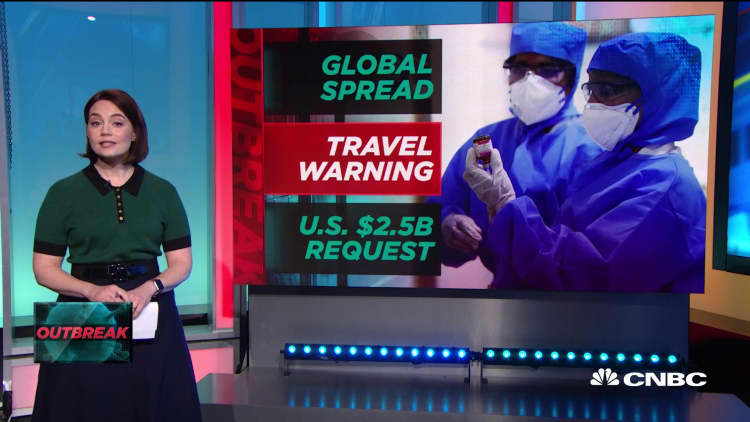Iran's Deputy Health Minister Iraj Harirchi looked visibly feverish as he spoke on state television Monday, downplaying the spread of the new coronavirus in Iran. Without a face mask on, wiping sweat off his forehead and speaking to local press, he coughed into a tissue several times. One day later, he tested positive for the coronavirus.
Iran's health ministry has rejected claims from some local officials that the number of dead and infected is far higher than reported. Iran's government confirmed 139 cases and 19 deaths from the fast-spreading virus as of Wednesday, the highest number of fatalities outside China, where the disease has taken more than 2,600 lives and sickened more than 80,000.
"The high number of deaths in Iran suggests that the number of infections in the country is much higher than declared by the authorities," Hasnain Malik, Dubai-based managing director for frontier markets equity strategy at Tellimer, told CNBC.
U.S. Secretary of State Mike Pompeo expressed concern on Tuesday that Tehran may be withholding "vital details" and urged all countries to "tell the truth about the coronavirus."
It's still unclear where the first cases of the virus in Iran came from; Iranian Health Minister Saeed Namaki said the first patients had previously done business in China. Another health official said it stemmed from a group of 700 Chinese clerical students studying in the religious city of Qom, where most of the cases are concentrated.
Iran hasn't suspended flights from China — one of its top trading partners — despite nearly all of its Middle Eastern neighbors doing so.
The country has canceled sports matches, concerts, and closed schools and universities in certain provinces, while workers have been disinfecting public transport venues and posting signs warning against touching surfaces in crowded places. Still, no city-wide quarantines have come into place and religious pilgrims are still moving in and out of Qom, Iran's coronavirus epicenter, which sees some 22 million religious tourists annually.
'The health ministry asked us not to talk about the numbers'
Suspicion of a state cover-up mounted after a legislator from Qom claimed there have been 50 deaths in the city of 1.2 million. Tehran refuted the figure and denied hiding anything.
The legislator, Ahmad Amirabadi Farahani, was quoted by semi-official news agency ILNA on Monday as accusing the government in Tehran of not being transparent about the scale of the outbreak, which had more than quadrupled in just three days, according to the figures it has reported to the World Health Organization (WHO). He said that in addition to Qom's 50 deaths, more than 250 people were under quarantine. Iran's health ministry rejected Farahani's claim.
"The rest of the media have not published this figure, but we prefer not to censor what concerns the coronavirus because people's lives are in danger," ILNA's editor Fatemeh Madiani told AFP news agency.
And Mohammadreza Ghadir, the director of Qom's University of Medical Sciences, said earlier this week: "The health ministry asked us not to talk about the numbers," according to a translation of a BBC Persian article.

Iran's neighbors have shut their borders with the country and most Middle Eastern countries have now suspended flights to and from Iran. Health authorities in Bahrain, Oman, Iraq, Kuwait, Afghanistan, the United Arab Emirates and even Canada say they have cases that stemmed from Iran.
"The government has aggravated the crisis for itself by hiding the outbreak of the virus and minimizing its importance," said Dina Esfandiary, an Iranian research fellow at the Harvard Kennedy School's Belfer Center. "This followed its desire to show solidarity with the Chinese a couple of weeks ago and keeping travel between the two countries open. This is why the crisis is worst in Iran."
Blaming the Islamic Republic's 'enemies'
Iran's economy is crumbling under the weight of heavy U.S. sanctions, which have been increasing in intensity and scope since President Donald Trump's administration withdrew from the 2015 Iran nuclear deal in 2018. Its currency is in free fall and inflation is around 50%, with an estimated 9.5% GDP (gross domestic product) contraction last year. The sanctions, many health experts say, have also created an obstacle to adequate preparedness.
The Islamic Republic saw the lowest parliamentary election turnout in its history last week at 42.5%, with many Iranians openly boycotting the vote — an apparent rebuke to the regime's legitimacy. Tehran "likely was slow to respond given their desire to get people out to vote in the recent parliamentary election," said Behnam ben Taleblu, a senior fellow at the Foundation for Defense of Democracies.
Iranian supreme leader Ayatollah Ali Khamenei blamed the low turnout on the Islamic Republic's "enemies" using coronavirus rumors to scare people.
One cleric in Qom even blamed Trump for the virus's spread in the city.
For many Iranians, the response by the state and religious establishment bodes poorly for the future.
"The regime's poor management of this crisis means there is a new threat from Iran: a public health crisis," ben Taleblu said. "There is a real concern inside Iran that this will only get worse."


